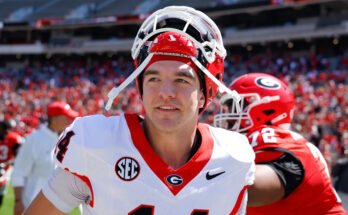Burial in the budget proposed by the Trump administration in 2026 is the virtual elimination of something called the zone of the mission of ecosystems. It is a program that monitors living things and the health of the land and water they live in. Ari Daniel de NPR reports that career scientists are deeply concerned about the potential cut.
Mary Louise Kelly, host:
Burial in the budget proposed by the Trump administration in 2026 is the virtual elimination of the zone of the mission of ecosystems. It is a program that monitors living things and the health of the land and water they live in. Ari Daniel de NPR reports that career scientists are deeply concerned about the potential cut.
(Soundbit of clicking objects)
Ari Daniel, Byline: Sam Droege crowds around his trunk, filled with buckets, boots and bottles before heading to a park on the edge of Washington, DC, at the top of what was once a discharge.
Sam Droege: I have a net. Yes, we will catch bees.
Daniel: No bees but all kinds of other bees.
Droege: Most of them, there is no tingling, there are no allergic reactions.
Daniel: We stop in a blackberry patch. His flowers swing in the breeze.
Droege: I don’t know if you can even see this bee in there, but …
Daniel: Where is he?
Dry: … that’s it.
Daniel: This little guy?
Dry: Yeah.
Daniel: Wow.
Droege: half the size of a rice grain. But most bees are super small.
Daniel: And yet these adolescent insects play a disproportionate role in the pollination of all kinds of plants, including those we cultivate and eat.
Droege: And therefore these small bees, they direct the world.
Daniel: Droege is with US Geological Survey, where he directs the Bee Lab, an outfit that supports researchers from other government agencies and universities that study native bees by helping states, for example, to identify rare bees and need protection.
Droege: We are here to advise and help people understand what kinds of bees are there, how they go, what is their status.
Daniel: Droege’s work at the USGS is part of the Ecosystems mission area, a group that helps the federal government to manage and preserve wildlife and the natural environment nationally.
Droege: There are people who work on the surveillance of bats, bird surveillance.
Daniel: There are teams that monitor fishing, environmental contaminants and fauna diseases.
Droege: So we are working on problems that have an impact on the nation as a whole. Someone has to look at the situation as a whole that what states and academics can often do.
Daniel: And it is this program, the mission area of ecosystems, or EMA, that the federal budget proposed in 2026 reduces by 90%. Droege The speculation due to the fact that EMA research on different species can shed light on regulations that limit the use of land and natural resources.
Droege: If you don’t know anything, you have no problem. So having this type of information is really annoying for business.
Daniel: NPR has contacted the management and budget office to confirm the expected reduction. In an email, a spokesperson responded, the EMA is, “quotes,” obviously unrelated to science and is exactly the kind of waste that President Trump ran outside the federal government “. Jill Baron does not agree. She is an ecological ecosystem environment at Colorado State University, and in the mid -90s, while in government, she helped create EMA.
Jill Baron: We suggested that it would be a more appropriate way to tackle the big societal questions than what we had before.
Daniel: Baron indicates his own 43 -year -old research study in the Rocky Mountain National Park watershed. At first, she and her colleagues were looking for evidence of acid rain. Instead, they found an excess of nitrogen from air pollution, which federal governments and states then intervened to reduce. And more recently, she has detected impacts on climate change.
Baron: If you stop long -term surveillance, you cannot only see if the changes are getting worse, you cannot see if the actions have really made a difference.
Daniel: In addition, EMA helps protect Americans from natural disasters such as floods, landslides, hurricanes and fire.
Paul Steblein: So, if you lose EMA, it really changes our ability to understand and respond appropriately to these challenges that seem to develop every day.
Daniel: Paul Steblein was the coordinator of forest fire sciences under EMA until his retirement at the end of last year.
Steblein: The reduction of a few million dollars will have billions of dollars in impact. It will affect people’s lives. This will affect their health. I think it’s short view.
Daniel: Back in the park in Washington, DC, Sam Droege, with a wrist, whips her net through blackberries.
(Soundbite to whisk through the flowers)
Droege: You see, there is this little bee here. And I have to be fast because the bees are very fast.
Daniel: He will bring back the bees he withdraws to the laboratory to identify them, then they will join a collection of some 800,000 bees that EMA and the researchers with which they associated have amassed during the decades.
Droege: It’s our life. For example, I would do this without being paid, which I can very well.
Daniel: Droege says that he and his colleagues now run to ensure that the vast bee library is safe, in case their work is suddenly closed. Ari Daniel, NPR News.
Copyright © 2025 NPR. All rights reserved. Visit the pages of use of the conditions of use of our website on www.npr.org for more information.
The accuracy and availability of NPR transcriptions may vary. The transcription text can be revised to correct errors or match audio updates. Audio on npr.org can be published after its original broadcast or publication. The file authorizing the NPR programming is the audio recording.



